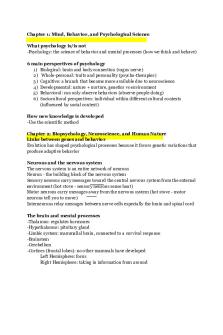Intro to developmental psych PDF

| Title | Intro to developmental psych |
|---|---|
| Course | Introduction To Cognitive Psychology |
| Institution | The Pennsylvania State University |
| Pages | 3 |
| File Size | 125.2 KB |
| File Type | |
| Total Downloads | 114 |
| Total Views | 157 |
Summary
These lecture notes are from Dr. Wyble's intro to cognitive/developmental psychology class and include diagrams, as well as highlighted key terms....
Description
Intro to developmental psych Dr. Brad Wyble Neuroscience The goal of cognitive psych is to understand the innerworkings of the world The simplest actions involve many different aspects of cognition Ex: catching a ball…what parts of the mind do we tap into? Some things include coordination, movement, communication, perception, motor skills, and language Mind Vs. Brain Mind--The set of computations and memory that allows you to think Brain—physical matter that creates the mind (neuroscience) BRAIN gets in the way of studying MIND How does memory work? World list example—false memory effect Human memory is organized according to MEANING Tracking eye movements Where we look when looking at a picture shows us the most common thing we look for are FACES Faces give us important information, focus by DEFAULT Studying the brain Uses EEG, FMRI COGNITIVE NEUROSCIENCE—how does the brain work? sometimes the brain gives us hints about how the mind works Ex: brain lesions have specific effects COGNITIVE PSYCHOLOGY—easier to study pure functions of mind if we don’t worry about neuroscience Producing speech is different than comprehending it The mind is mysterious Linear perspective—depth perception, illusions, size, shape, lines 1. Most computations lie below our level of awareness to we make inferences
2. The mind uses many different ways to solve a problem…sometimes, 1 sometimes all 3. We are really great at solving problems, many ways to do so gives us flexibility In cognition: The things that are EASY for computers are HARD for humans, and vice versa Ex: games, doing math vs. singing, dancing, emotions Cognitive psychology affects CONSUMER BEHAVIOR—we can use it to shape the behavior of others and cognitive limitations that affect everyday life History of Cognitive Psych Many careers, 100s years of studying evolution reminds us of biases that are inherent in science, we don’t know outside our bubble “information” is a thing we take for granted EARLY 1800S- studying mind wasn’t possible, it was known that environment changed behavior (feral children) Doctors knew muscles were controlled by nerves Forefathers of cognitive psychology GUSTAV FECHNER—highly eccentric, stared at the sun and blinded himself to develop method of studying quantitatively Linked physical properties of a stimulus to a mental experiment Learned about PSYCHOSIS Objects look larger if they are THREATENING (anecdotal observation) Main takeaway*****--cognitive psychology studies what is TRUE about the mind, not intuitions or opinions of how it works LUDWIG HEMHOLTZ discovered that human vision has red green and blue color channels by analyzing behavior alone—he was right “sensations do not provide direct access to reality” We perceive reconstructions of reality and cannot access sensory info directly DONDERS—realized that some mental events can’t be studied directly We can deduce them from behaviors Developed the SIMPLE TIME RT TASK—press button when you see light EBBINGHAUS—memorized lists of syllables and waited to relearn
Recorded the “savings” while learning same list Created EBBINGHAUSES RETENTION CURVE—lost 40% of info, drops charting how quickly it’s forgotten WUNDT—first self-identifying psychologist and fist lab Developed ANALYTIC INTROSPECTION—describe experiences and thought processes in detail Developed STRUCTURALISM—our experience is a combo of sensations Core principle #1 We are unaware of most mental processes—fechner’s method gives us what is below our awareness
Ebbinghaus retention curve graph...
Similar Free PDFs

Intro to developmental psych
- 3 Pages

Week 1 Intro to Developmental Psych
- 71 Pages

developmental psych
- 6 Pages

Intro To Psych Final Exam
- 24 Pages

Intro to psych - chapter 1,2
- 2 Pages

Intro to Psych Course Notes
- 44 Pages

Intro to Psych - Topic 3
- 2 Pages

Intro to psych exam notes
- 32 Pages

Developmental Psych Notes
- 55 Pages

Intro Psych
- 7 Pages

Intro to Psych-Chapter 2 notes
- 2 Pages
Popular Institutions
- Tinajero National High School - Annex
- Politeknik Caltex Riau
- Yokohama City University
- SGT University
- University of Al-Qadisiyah
- Divine Word College of Vigan
- Techniek College Rotterdam
- Universidade de Santiago
- Universiti Teknologi MARA Cawangan Johor Kampus Pasir Gudang
- Poltekkes Kemenkes Yogyakarta
- Baguio City National High School
- Colegio san marcos
- preparatoria uno
- Centro de Bachillerato Tecnológico Industrial y de Servicios No. 107
- Dalian Maritime University
- Quang Trung Secondary School
- Colegio Tecnológico en Informática
- Corporación Regional de Educación Superior
- Grupo CEDVA
- Dar Al Uloom University
- Centro de Estudios Preuniversitarios de la Universidad Nacional de Ingeniería
- 上智大学
- Aakash International School, Nuna Majara
- San Felipe Neri Catholic School
- Kang Chiao International School - New Taipei City
- Misamis Occidental National High School
- Institución Educativa Escuela Normal Juan Ladrilleros
- Kolehiyo ng Pantukan
- Batanes State College
- Instituto Continental
- Sekolah Menengah Kejuruan Kesehatan Kaltara (Tarakan)
- Colegio de La Inmaculada Concepcion - Cebu




